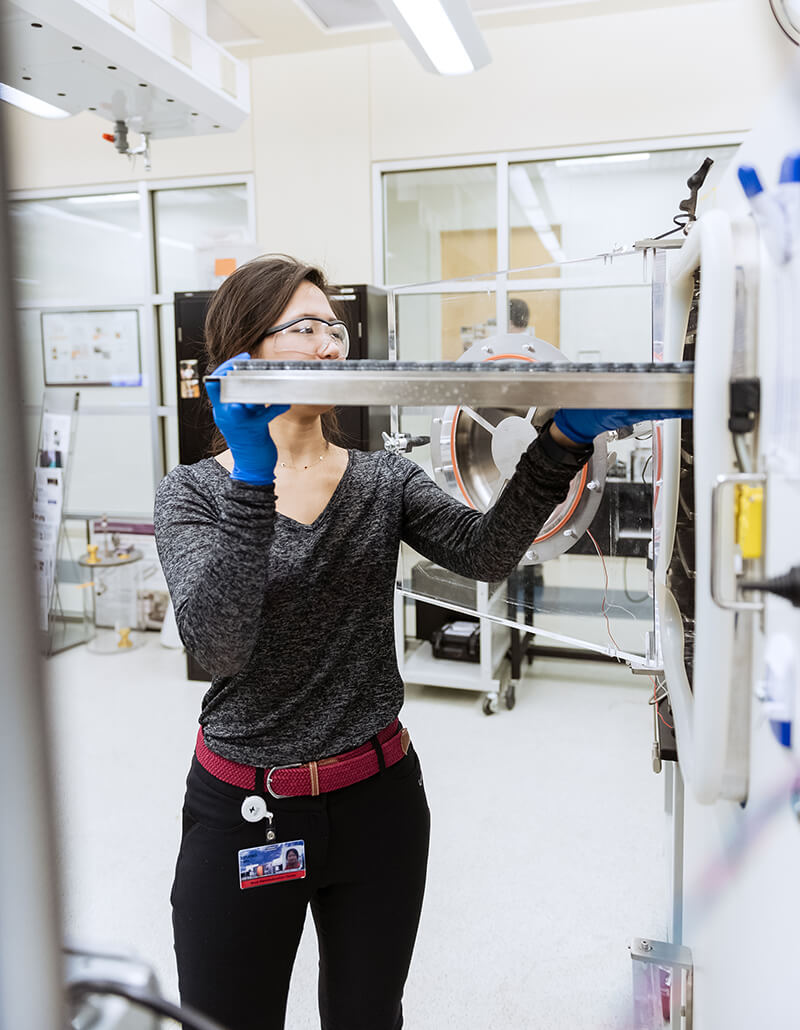July 8, 2020
LyoHUB adds new course in freeze-drying to resources that can assist COVID-19 research in diagnostics, therapeutics and vaccines
 A lyophilizer is loaded in LyoHUB’s lab in Birck Nanotechnology Center. LyoHUB is a university-industry center at Purdue whose goal is the efficiency, science and technology of freeze-drying in pharmaceuticals and other areas. (Purdue University photo/Rebecca McElhoe)
Download image
A lyophilizer is loaded in LyoHUB’s lab in Birck Nanotechnology Center. LyoHUB is a university-industry center at Purdue whose goal is the efficiency, science and technology of freeze-drying in pharmaceuticals and other areas. (Purdue University photo/Rebecca McElhoe)
Download image
LyoHUB, a university-industry center at Purdue whose goal is the efficiency, science and technology of freeze-drying in pharmaceuticals and other areas, is offering a new free online course and other resources to help others’ research — including efforts related to COVID-19 — benefit from LyoHUB’s facilities and knowledge.
Freeze-drying, also called lyophilization, is a process that gently removes water from materials to produce a dried product. It was developed during World War II to preserve blood products and penicillin. Freeze-drying is commonly used in the food industry. For pharmaceuticals, lyophilization is often used to stabilize sensitive drugs, lengthening the shelf life while preserving the critical efficacy of the medicine. LyoHUB has has worked with researchers to freeze-dry everything from leaves to cricket protein.
“The pharmaceutical industry uses solid forms of drugs to protect them during manufacturing, shipping, and storage. If we tried to remove the water by heating, many drugs would be destroyed,” said Elizabeth Topp, a professor in Purdue’s Department of Industrial and Physical Pharmacy and co-founder and co-director of LyoHUB. “Lyophilization removes water at low temperature and low pressure, safely drying sensitive drugs.”
The new short course, which presents the basics of freeze-drying of pharmaceuticals, was developed and recorded by leading lyophilization experts nationwide. The course has eight 20-minutes modules to make it easy to work into busy schedules:
- Introduction to pharmaceutical lyophilization.
- Overview of the lyophilization process.
- Production lyophilizers.
- Quality attributes of lyophilized products.
- Glass transition temperature.
- Freezing.
- Primary and secondary drying.
- Graphical design space.
Through an online laboratory exercise in pharmaceutical lyophilization, the course allows students to step virtually inside the LyoHUB demonstration facility to see how a lyophilization cycle is run. The course was developed through a grant from the National Institute for Innovation in Manufacturing Biopharmaceuticals (NIIMBL) and is available free of charge at https://pharmahub.org/courses/lyo101.
Other LyoHUB resources
LyoLaunchPad is a program that allows new users on campus to conduct an approved, nonproprietary, short-term project in the LyoHUB demonstration facility at no charge. Participants are asked to give a short presentation for LyoHUB members at the completion of the project. For more information on LyoLaunchPad, contact Jennifer Gray, LyoHUB operations manager, at gray160@purdue.edu.
LyoPRONTO, introduced this year, is a free, open source, user-friendly lyophilization simulation and process optimization tool. It includes freezing, primary drying modeling, and optimization modules, as well as a design space generator. LyoPRONTO can be used to model the lyophilization process and create more efficient cycles. The tool also can determine the vial heat transfer parameters and product resistance characteristics, thus reducing the number of experiments. LyoPRONTO is available on two platforms: (Python Source Code): lyopronto.org and the online version with graphical user interface (GUI): http://lyopronto.rcac.purdue.edu/.
“We are excited that LyoHUB capabilities are being utilized right now to speed up development of novel COVID-19 diagnostics. We are ready to offer support for other efforts to improve lyophilization for faster manufacturing of COVID-19 reagents, drugs or vaccines” said Alina Alexeenko, professor in the School of Aeronautics and Astronautics and the Davidson School of Chemical Engineering and co-founder and co-director of LyoHUB.
About LyoHUB
LyoHUB (http://www.lyohub.org), a university-industry center at Purdue University, is advancing the science and technology of lyophilization in order to lower costs and improve the availability of lyophilized products. Though time-consuming and inefficient in its current state, lyophilization is a critical manufacturing process for the pharmaceutical industry. It is used in about 25 percent of new injectable drugs, vaccines, and biological products. The need for advancements in this area is magnified as COVID-19 lyophilized treatments, such as Gilead’s Remdesivir®, diagnostic reagents and other countermeasures are being developed and evaluated.
Birck Nanotechnology Center at Purdue is home of the LyoHUB Lyophilization Technology Demonstration Facility, a research lab featuring state-of-the-art lyophilization equipment and analytical tools run by several experienced lyophilization “superusers.” The facility has hosted more than 876 lyophilization runs since it opened in 2016. A description of the facility, along with an equipment listing is available at https://pharmahub.org/groups/lyo/demofacility.
Sources: Jennifer Gray, gray160@purdue.edus
Alina Alexeenko, alexeenk@purdue.edu
Elizabeth Topp, topp@purdue.edu

